Can’t Focus at Work? Try These Concentration Hacks

Sorry, there were no results found for “”
Sorry, there were no results found for “”
Sorry, there were no results found for “”
Welcome to the daily struggle of modern work life—you start a task with the best intentions, only to find yourself lost in TikTok minutes later. You glance at your email and suddenly need a quick sandwich.
We’ve all been there—the frustrating battle of trying to focus at work amidst distractions.
Join us on a journey to master focus and concentration amidst daily chaos. If you’re tired of battling distractions, we’ve got concentration hacks for you.
And for those seeking a digital ally in the battle for focus, stay tuned as we explore how tools such as ClickUp help you reclaim your focus and amp up your attention.
Let’s dive in!
Being focused at work is a real struggle, especially in a culture where over one-third of workers work more than 48 hours per week.
No wonder you’re distracted at times!
And let’s face it: concentration becomes a distant dream when you feel bored or distracted.
But it’s not just the burnout. Constant notifications, emails, multitasking demands, lack of interest in certain tasks, and stress can derail your focus.
Alright, how do you boost your focus with all these distractions? First, break down the brain’s focus stages so you understand yourself better.
Focusing involves a complex interplay between your brain’s cognitive functions and neural networks. Knowing the focus stages will give you a glimpse into how your brains handle attention and concentration.
Here are the different stages of focus in the human brain:
Knowing what disrupts our focus stages will help us improve our concentration. Here is the neural basis of why we lose focus:
If you’re finding it hard to focus and have difficulty concentrating at work, here are some possible reasons:
Procrastination is when you dodge critical tasks, convincing yourself you’ll tackle them later.
Constantly putting things off adds stress and tanks your productivity. Procrastination messes with your work focus, causing unnecessary delays and distractions.
Imagine you’ve delayed a crucial report until the last minute. You’re stressed, tired, and can’t focus the night before it’s due. As you hurriedly put the report together, you might miss some vital details, affecting the overall quality of your work.
When you postpone tasks, the upcoming deadlines create pressure and a sense of urgency. This heightened stress level can impair your cognitive functions and cause trouble concentrating on a difficult task.
Your brain functions 24/7 for you. When you sleep, it takes a break to recharge. During deep sleep, your brain cells repair itself and restore homeostasis (internal balance). This helps prepare your brain for the next day.
However, inadequate or irregular sleep overworks your brain cells, leading to brain fog. Sleep deprivation delays brain signal transmission, making it hard to concentrate and leaving you tired all day.
For example, you have an important presentation at work the following day. Yet, you stay up late binge-watching a TV series, getting only a few hours of sleep.
This increases your cortisol levels—the infamous stress hormone that increases stress and negatively affects your focus. The next day, during the presentation, you find it challenging to articulate your thoughts clearly and stay on track.
Lack of focus could be due to various health issues. Mental and physical health problems can impact your concentration and attention span.
Some conditions that affect your focus are:
Spot the signs and symptoms of these health conditions early on for quick intervention and effective management. Contact healthcare professionals for proper guidance to deal with whatever’s affecting your focus.
Attention-Deficit/Hyperactivity Disorder (ADHD) is a medical condition that affects how the brain works. People with ADHD find it challenging to stay focused, get easily distracted, and have difficulty sitting still.
Tasks that others find manageable can be challenging for someone with ADHD, especially the slow, long ones, those with delayed rewards, or repetitive tasks.
It’s more than just a lack of focus; it’s more about not having complete control over what you focus on. Lack of control can manifest in various ways, such as difficulty starting tasks, mind wandering, or getting overly focused on unimportant factors.
For example, imagine being in a meeting and trying to listen to the speaker, but with ADHD, you might easily get distracted by things like a flickering light or someone tapping a pen.
Even if you try hard, you might miss crucial details in the meeting, impacting your overall work performance.
Check out these ADHD apps!
Depression and anxiety, covering a wide range, bring in factors like cognitive distortions, neurotransmitter imbalance, and life stressors. Together, these affect your ability to focus.
These conditions, with chemical imbalances and structural brain changes, make maintaining attention and cognitive performance challenging.
Depression disrupts your sleep, mood, and stress levels, making you feel unmotivated and stuck in bed. On the other hand, anxiety brings on excessive worry, stress over little things, and distractions from what matters.
Both can throw off your focus and make completing daily chores harder.
Fatigue means feeling extremely tired, having low energy levels and trouble focusing. It can make concentrating hard, reduce your attention span, and increase the chances of making mistakes. And it hampers your problem-solving and decision-making abilities, which can impact how well you do at work.
Burnout, a chronic mix of feeling physically and emotionally drained, usually happens when stress and too much work pile up. It’s not just about feeling tired; it also affects your mind and emotions.
As fatigue kicks in, you make more mistakes, adding to stress and making you more susceptible to burnout. On the flip side, burnout drains your energy even more and leads to fatigue due to the emotional toll.
This cycle continues, challenging your focus at work.
When you’ve got a long to-do list, the temptation to multitask is real. You might think you’re a pro at context-switching and being super productive. However, it’s not as helpful as it appears. Studies show that reorienting takes up to 23 minutes to switch between tasks entirely.
Multitasking makes your mind jump around, causing mental fatigue, lowering productivity, and increasing the likelihood of mistakes.
On the other hand, dedicating your attention to a single task eliminates the need for constant context-switching. This focused approach is more time-efficient, and you’re likely to complete the task more efficiently, with fewer errors, and without the mental toll of constant multitasking.
Feeling pressured or stressed out can lower your focus, especially in high-pressure situations like meeting deadlines, dealing with expectations, or chasing personal goals. Stress just makes it harder to stay focused.
When you’re stressed, your body releases cortisol, and if it stays high for too long, it impairs your focus and decision-making skills.
Dealing with constant stress and challenging situations—like tight deadlines, conflicts, high expectations, or changes at work—makes it tough to stay focused on tasks. Staying focused on specific thoughts is harder when your mind is worried.
Numerous environmental factors can distract you; unfortunately, you can’t shut off your brain to get away from them.
Understanding and managing these productivity killers helps you create a focused workspace.
Noise is a common factor—loud conversations, traffic, or disruptions. It affects concentration and hampers focus.
Clutter is another environmental distraction. A disorganized or cluttered workspace can overload visual stimuli, making prioritizing and focusing on specific tasks challenging. Interruptions from a phone buzzing with notifications or colleagues dropping by can distract you.
When you love your job, focus comes easy, you take charge, and work doesn’t feel like a chore. But what if going to work feels more like a marathon you didn’t sign up for?
The lack of motivation can make even the simplest task feel like an overwhelming burden.
When you’re motivated about a task, your brain releases chemicals like oxytocin that keep you alert and focused. But when motivation is low, tasks become more challenging due to disinterest, and focusing feels like trying to juggle with hands tied behind your back.
Now that you understand why you might be losing focus at work let’s see how we can tackle these challenges:
ClickUp is a versatile project management tool designed to enhance collaboration and productivity. This all-in-one app helps you stay focused and productive. It helps block distractions like social media and time-wasting websites and create a focused digital space, allowing you to concentrate on tasks and goals.
Let’s explore the features of ClickUp that will help you and your team maintain focus at work.
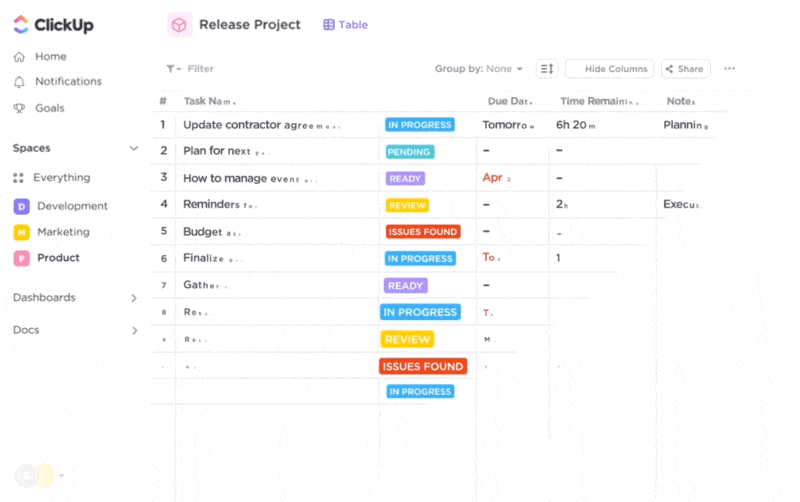
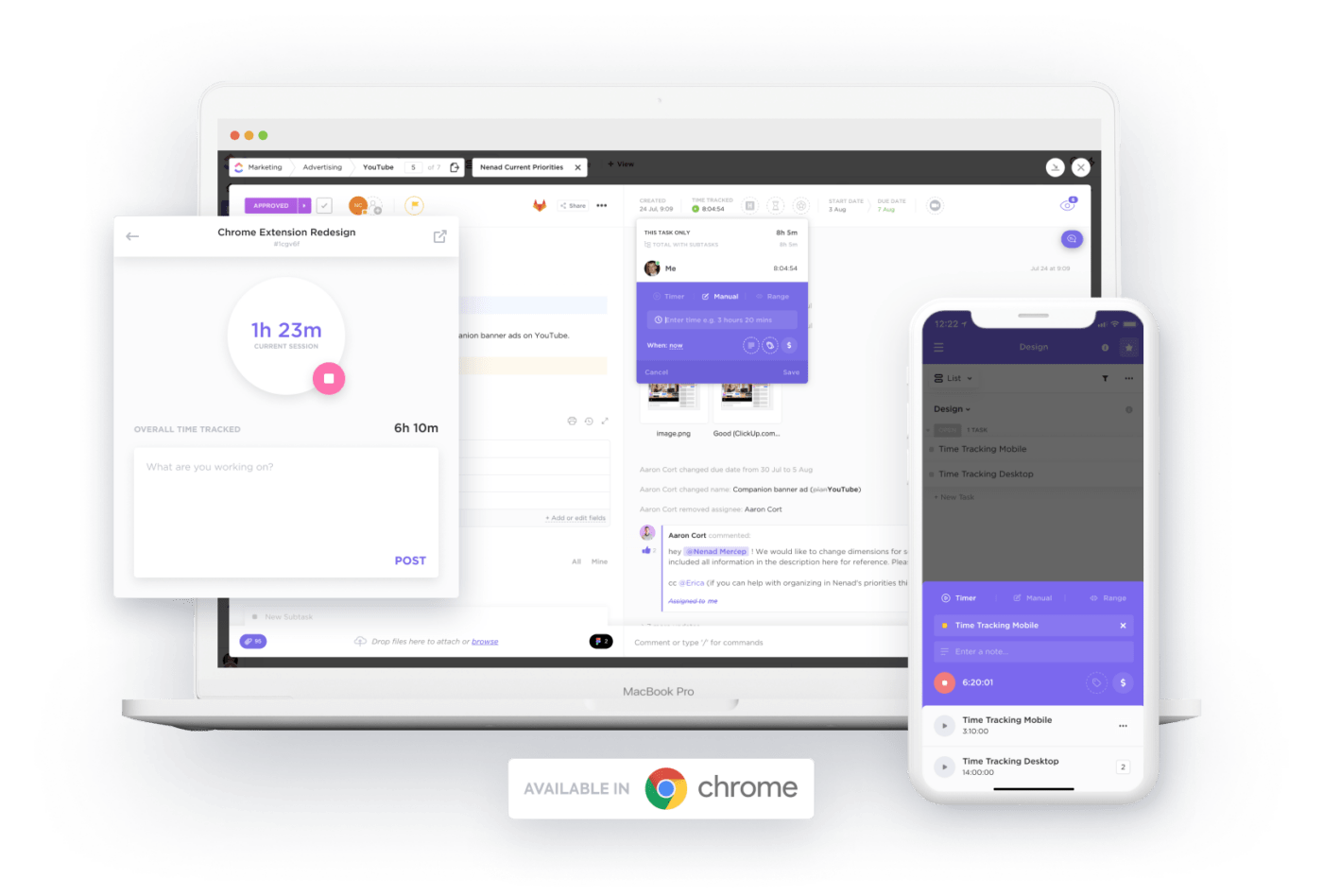

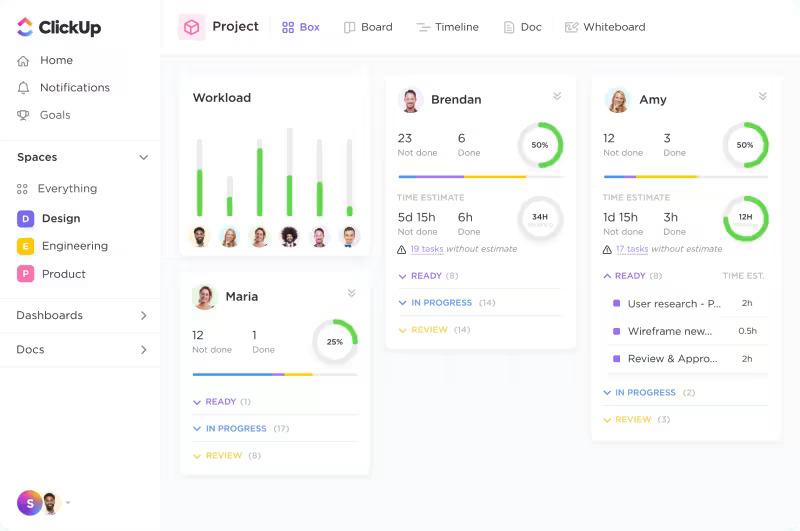
Balance workloads with ClickUp Views. These are fully customizable viewing options to help you visualize and manage your tasks efficiently.
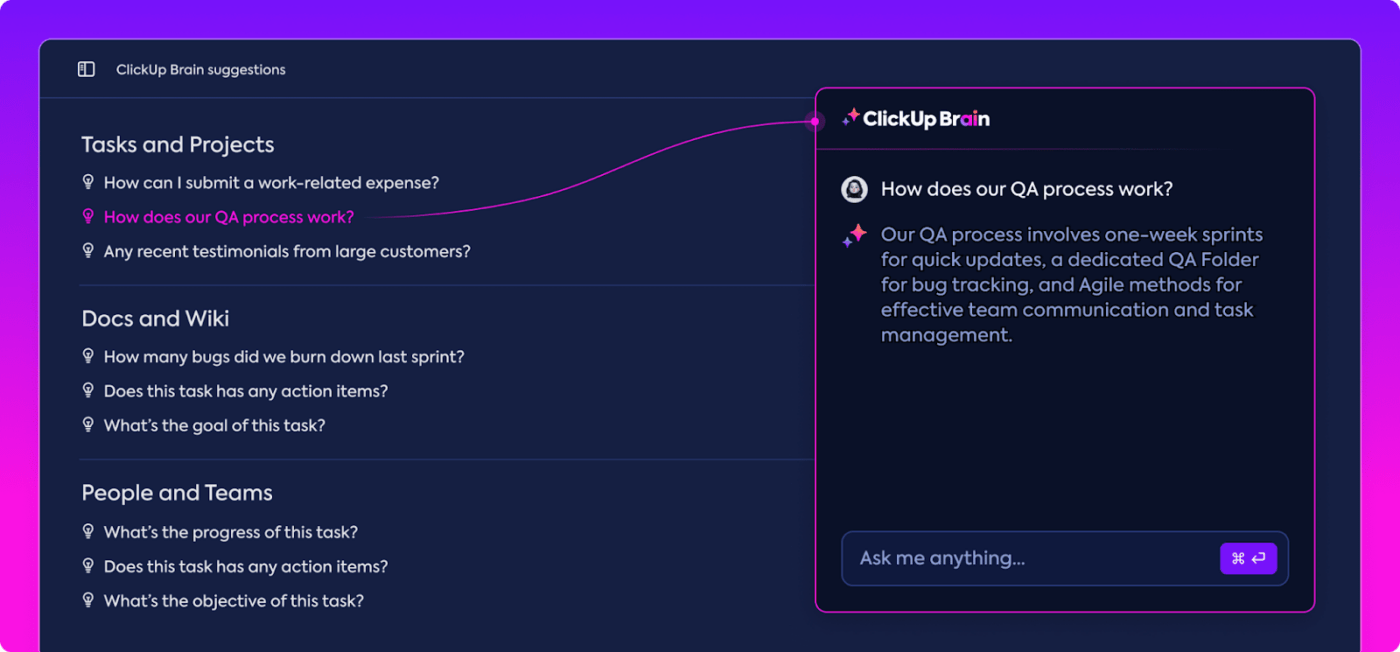
Elevate your work efficiency with ClickUp Brain—it streamlines tasks, enhances collaboration, and provides intelligent insights to optimize your workflow.
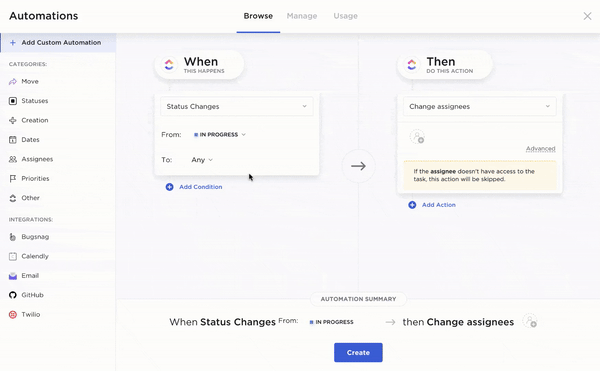
ClickUp Automation allows you to concentrate on what truly matters—your work. Whether assigning tasks, updating statuses, or sending notifications, these automation options streamline processes, eliminating the need for constant oversight.
It enhances your focus by minimizing distractions and allowing you to concentrate on more meaningful aspects of your work.
Disciplined time management helps you maintain focus and concentration in daily life. When you allocate specific time slots for different activities, you know when to focus on what.
Moreover, disciplined time management isn’t just about what to prioritize; it’s equally about deprioritization. Trim away what doesn’t match your goals or priorities so you can concentrate on what matters.
If you don’t know where to start, let us help you.
Mindfulness and meditation enhance focus by training the mind to stay present and attentive. Being mindful makes you aware of your thoughts and surroundings, while meditation is a technique to train your mind for mindfulness, focusing on things like your breathing.
Regular practice makes you more aware of your thoughts and emotions, enabling you to redirect your attention to the task at hand. This helps you concentrate, manage distractions, and ultimately enhance overall focus and concentration.
Here’s a simple yet effective technique to enhance your focus. Find a quiet place, sit comfortably, and focus on your breathing. Inhale and exhale naturally, paying attention to each breath. When your mind wanders, gently bring it back to your breath. Consistent practice will improve your overall focus and concentration.
Good sleep hygiene practices are integral to enhancing focus and improving cognitive function. Sleep hygiene involves promoting quality sleep, like maintaining a consistent sleep schedule, creating a comfortable sleep environment, and avoiding stimulants before bedtime.
Following these practices consistently regulates the sleep-wake cycle, positively impacting attention and focus during waking hours.
Here are a few practical tips to improve your sleep hygiene and get sufficient rest to promote sustained focus in your daily life.
Working effectively on complex problems requires a distraction-free environment, but balancing team collaboration and individual-focused time is crucial.
You can achieve this balance by planning time for team interactions and allocating individual-focused time, promoting a positive environment for individual work and team collaboration.
Despite the challenges, here are tips to minimize distractions and enhance concentration.
A balanced lifestyle has a ripple effect on your overall cognitive performance. Let’s look into the importance of a healthy lifestyle and how it affects your focus and productivity at the workplace.
Starting your day by tackling difficult tasks head-on can significantly boost focus throughout the day.
When you dive into challenging tasks, your mind is fresh, and your mental energy levels are high. This sets a tone of accomplishment, triggering a positive psychological effect. The satisfaction of overcoming a tough challenge releases dopamine, a chemical associated with reward and motivation, building momentum for the rest of the day.
Moreover, addressing difficult tasks first minimizes the looming stress and mental clutter of procrastination. You free up mental space, enabling better concentration on subsequent tasks.
So, consider embracing it first the next time you’re tempted to postpone a tough task!
Taking care of your mental health helps you achieve optimal concentration. Breaking the cycle of stress restores focus.
Implementing stress-management techniques can significantly enhance your mental health, promote a sense of calmness, and pave the way for improved focus and concentration in your daily life.
And there you have it—the pivotal role of focus in driving productivity within the contemporary workplace and a comprehensive guide on how to focus amidst all the chaos.
In today’s world, staying focused is critical for top-notch results. From juggling digital distractions to multitasking, we need proactive solutions. Trying mindfulness, refining time management skills, and creating a work-friendly space are vital steps to boost focus.
A lack of focus doesn’t just affect personal performance; it ripples through your teams and overall outcomes.
Creating a focus-driven culture requires continuous workplace learning initiatives. Discussing effective strategies, sharing successes, and exploring solutions fosters collaboration.
With features like task management, time tracking, and goal setting, ClickUp, one of the best focus apps, helps teams stay organized and focused on their objectives. Sign Up for FREE and stay focused throughout your day.
If you find it difficult to focus at work, it could be digital distractions, multitasking, or the modern work buzz. Pinpointing the cause can help you find solutions and regain that concentration.
Stress and worry at work can be a focus-killer. Break tasks into smaller chunks, take short breaks, and sometimes just step away for a minute. It helps to regain perspective and keeps you focused amid the chaos.
Try breaking tasks into smaller, manageable chunks to reclaim your focus at work. Prioritize your to-do list, declutter your workspace, and set specific time blocks for focused work.
Experiment with techniques to find what works best for you, and don’t forget to stay hydrated and well-rested—small adjustments can make a big difference in getting your focus back on track.
© 2026 ClickUp